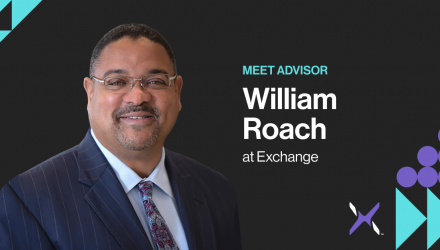Evan Harp is sitting down with the Exchange Advisor Council members. His goal is to learn their back stories, what they plan to bring to Exchange, and to unpack some of their market views. This week he spoke to Globalt’s William Roach.
How Bill Roach Went From Chemistry to Finance
Evan Harp: How did you get where you are now?
William Roach: I started off in chemical engineering at Purdue University, knowing nothing about the investment business. From there, I went and worked for Dow Chemical in the chemical industry. Then I got a leadership scholarship to go to Columbia’s MBA program. That’s where I got exposure to the investment business. It’s also where I got my first exposure to even understanding what the stock market was. That led me to my first job.
After finishing Columbia, I joined Goldman Sachs in New York on their long-term taxable desk, selling bonds and fixed income securities. At that time, it was a pretty volatile period in the market, both in the investment world and in life in general.
Roach: I went from there to Western Asset Management in Pasadena, moving from the sell side of the business to the buy side. I was calling on municipalities to try to get them to use Western Asset Management as a money manager. Angela Allen approached me in ’91 to join Globalt as a partner when the farm firm was really just starting. Globalt had $10 million under management and two clients: the Sunday School Board of the Southern Baptist Convention and the Georgia firefighters. My job was to go find some clients. We were very blessed to cross $1 billion after seven years of utilizing a superior growth strategy. I became president in ’99, just before the lovely technology bubble burst. I surely had asked myself what the hell I’d gotten myself into. [Laughs.]
Roach on ETF Strategies
Roach: But we weathered the storm. We went to Ned Davis research to have them help us build an asset allocation strategy in 2001, and spent two years going back and forth with Ned Davis to build our proprietary asset allocation model. Then we offered our ETF strategies in 2003. Synovus acquired us in May of 2002. And again, it was opportunistic on both sides; it gave us greater distribution. It gave Synovus a growth strategy to sell to their clients, and then an ETF strategy that has been very successful with their brokers for their clientele. We now have a 20-year track record of managing ETF portfolios.
Harp: What inspired you to join the Exchange Advisor Committee?
Roach: It was what I’ve seen since we started the growth in the ETF space, both company-wise and people-wise. It’s amazing, going back to the Inside ETF days to where we are today. It is amazing how many people are affiliated with the business today.
William Roach on the Market
Harp: What market trend or stories do you feel are under the radar right now?
Roach: The story that kind of sticks out with me is that the 60/40 portfolio is dead. I’m a student of history. As such, I still believe a diversified portfolio over time yields better results than an approach that is concentrated in one asset class or another. I do believe there are significant opportunities for individual investors in a 60/40 portfolio that might incorporate some additional asset classes outside of just stocks and bonds. In our portfolios, we’ve got gold and gold miners as part of our allocation to the alternative space, and we continue to look for noncorrelated subclasses to include in our portfolios to benefit our clients over the long run.
Roach Talks Exchange
Harp: What do you feel Exchange has done well, and what changes are you looking forward to advocating for?
Roach: I think Exchange has done a phenomenal job of getting people together across industries and different markets and providing meaningful content to all of those who attend. I think there’s something for everyone. I think Exchange has been an ideal environment to network with other professionals in the financial services industry period, not just the ETF space.
I’m surely advocating for more women and minorities to participate both in the program and to attend the event. I think it’s important to understand wealth transfer and how much money will be transferred to women and minorities, in the next 25 years. And to the LGBTQIA+ community as well. That is not getting the recognition that it needs. I still find myself in a pretty small group there that are a minority. There are clearly more now than they were 10 years ago, but still still underrepresented.
Register for Exchange 2024 here.
For more news, information, and analysis, visit VettaFi | ETF Trends.
